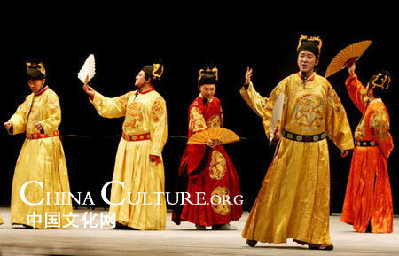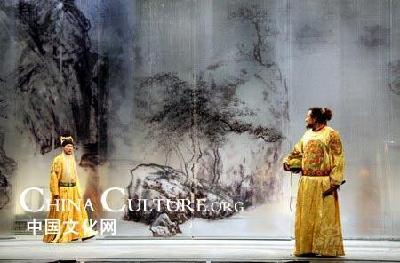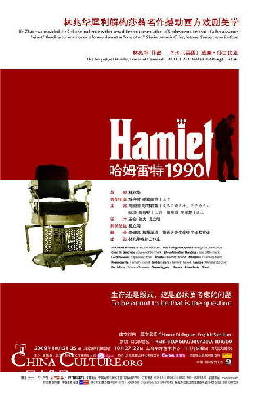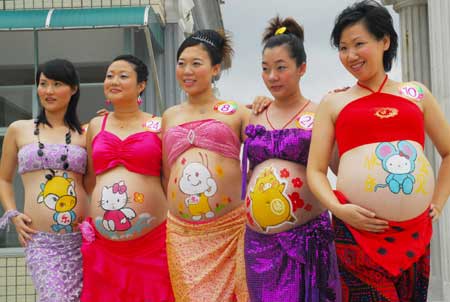| Home > Living in China > Art |
Nanjing Welcomes World Famous Drama Festival
2008 Theater of the Nations Festival opened in Nanjing, capital of east China's Jiangsu Province. The 31st session of this world-famous drama festival is from Oct.16 to 26 . And it's held first time in China. 36 theaters from all five continents are expected to attend.
The festival covers all genres to showcase a full spectrum of theater. With the theme, "Theater Tradition and New Appearance of the World", the festival covers a wide range of drama.
|
|
On the schedule are the street drama "Prometheus" from Greece, broadway musical "Aida", "Swan Lake" and "The Nutcracker" from Russia, "Romeo and Juliet" from the Republic of Korea, "Cyrano de Bergerac" from Japan, "Drumstruck" from South Africa, "Woyzeck" from Germany, Australian puppetry show "Forest in the Night" , and two interpretations of "Hamlet." One is put on by the Russian Drama Theater named After M. Gorky Astana of Kazakhstan and the other by renowned Chinese director Lin Zhaohua. These plays will be staged in theaters around Beijing.
Chinese dramas, including "Thunder Storm", “Ming? "The Legend of the Overlord", "In the Mood for Love", "Occidental Mahjong" (Hong Kong) and "The Secret Files of Detective Piggy" (Taiwan) will also be staged.
The festival was initiated in 1957 by the International Theater Institute (ITI), a sub-organization of United Nations Educational, Scientific and Cultural Organization (UNESCO).
China joined ITI in 1981 and became an executive committee member last month.
A forum with the theme, "Development of Theater in Globalization" is also expected to be held during the festival.
Lear-ning from Shakespeare
While theater-goers are familiar with Shakespeare's tragedy King Lear, seeing the story placed in the context of a certain dynasty in China, is certainly a novelty.
Director Tian Qinxin and playwright Shi Yue try to do just that in the play titled Ming, that kicked off the 2008 Beijing International Drama Festival at the National Center for the Performing Arts on Oct 10.
|
|
The old Emperor of the Ming Dynasty thinks of abdicating the throne, but cannot decide which of his three sons should get it, the effete eldest son, cruel second son or the frank and honest youngest. All three have their eyes on the throne. In the race for power, people go crazy, are used, find themselves in key positions, lose out and even die. Everyone is drawn into the cycle of power, honor and desire.
A eunuch suggests that the Emperor read Shakespeare's King Lear, who also faces the dilemma of how to carve up his kingdom among his three daughters when he decides to abdicate. Though the starting point of the two stories is the same, they lead to very different endings.
"The theme of this year's drama festival is 'Forever Shakespeare'. I love Shakespeare but want to explore his thoughts through a new Chinese story. Ming and King Lear have interesting and dramatic similarities and contrast, which reminds me of the Zen," says director Tian who is arguably the best woman director in today's Chinese theater.
The playwright Shi is the young writer of the best-selling novel, Those Things in the Ming Dynasty. After reading this novel, Tian approached him with a request that he write "a play which is King Lear, but also a story of the Ming Dynasty; is set in ancient times but is also relevant today; and may not be glorious but will always live in people's hearts."
Shi struggled a long time to meet all of these requirements but eventually came up with a drama that he says is "for what people have lost but regain; possess but finally miss; stick to but eventually give up and deeply love but also hate".
The drama is staged from Oct 10 till Oct 15.
Avant-garde version of Hamlet to be staged again
A popular avant-garde version of Shakespeare's classic "Hamlet" will be on stage again next week after its premiere 18 years ago.
In 1990, the play, directed by Lin Zhaohua, a leading artist of Chinese avant-garde theater, gained huge popularity and roused great controversy in China for its unique perspective and performance.
|
|
In the play, the role of Hamlet was divided among different actors, switching from time to time. So did other characters. For instance, Pu Cunxi, the hero, was Hamlet sometimes and the King Claudius for a while.
"I want to demonstrate the concept of 'everybody is Hamlet'," said the 72-year-old director during a rehearsal here Saturday, "All characters shared elements of good and evil, honesty and falsehood. I mean to blur morality difference in apparently opposed characters."
The stage design was quite contemporary. The King and Queen were seated on a barber's chair. A grave maker made a phone call to his colleagues. Ceiling fans are "swords" used by Hamlet.
Actors were not wearing costumes but their own clothes.
"I want to draw Hamlet closer to us as our brother and one of us, instead of making him an alien noble," Lin said. "For me, he is not a prince revenging for justice, nor a humanism hero, but part of us. Facing your truly ego is the most positive, bravest and heroic posture that modern people can have." The play was not apparently different from the edition 18 years ago except for the actors, Lin said.
Hamlet is played mostly by Pu Cunxin, a renowned actor who played leading roles in several famous Chinese dramas such as "Thunderstorm," "Teahouse" and "The Three Sisters, Waiting for Godot". He was the only one left of all actors in the play's premiere.
King Claudius and Queen Gertrude are played respectively by Zhou Mingshan and Chen Jin, both veterans, while Ophelia go to Gao Yuanyuan, a young starlet who played in several films.
Lin was one of the pioneers of Experimental Theatre Movement that brought Chinese theater into its modernistic stage by introducing non-illusionistic style and techniques in the 1980s and 1990s.
The play will be staged in Beijing from Oct. 21 to 25, in Shanghai from Oct. 27 to 28 and in Shenzhen from Nov. 6 to 8.
Art
 more
more"Peony Pavilion" staged on
Dance drama "Peony Pavilion" is staged at the Shanghai
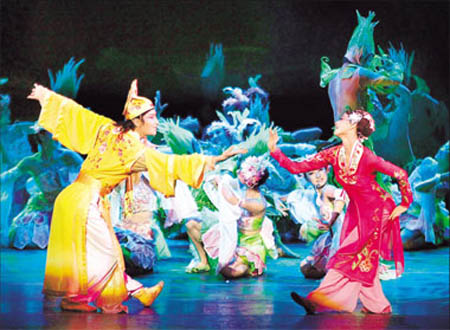
Classic Chinese Handicraft:
Porcelain pillows, as classic Chinese handicraft,
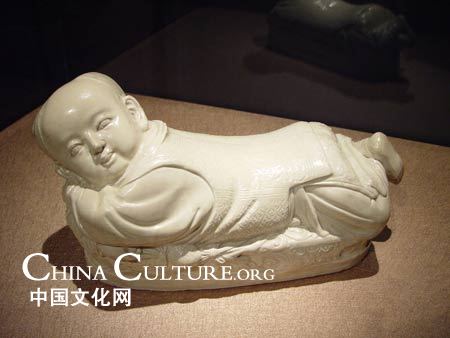
Chinese Treasures Returned from
As witness of Chinese culture and custom, countless treasures
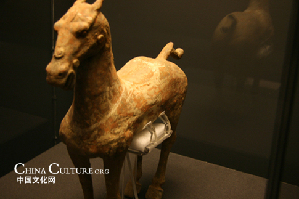
Customs
 more
moreChinese Kungfu
Kungfu Taste: Learn Martial Art in Shaolin Temple
The mention of Shaolin Temple conjures up images of a quiet and
Keet Kune Do will reappears on screen: BRUCE Lee and
The Legend of Bruce Lee is shot by China Central Television
The Road to the Olympic Games for Wushu
Wushu, also called kungfu, martial arts, is attracting more and more




 print
print  email
email  Favorite
Favorite  Transtlate
Transtlate 